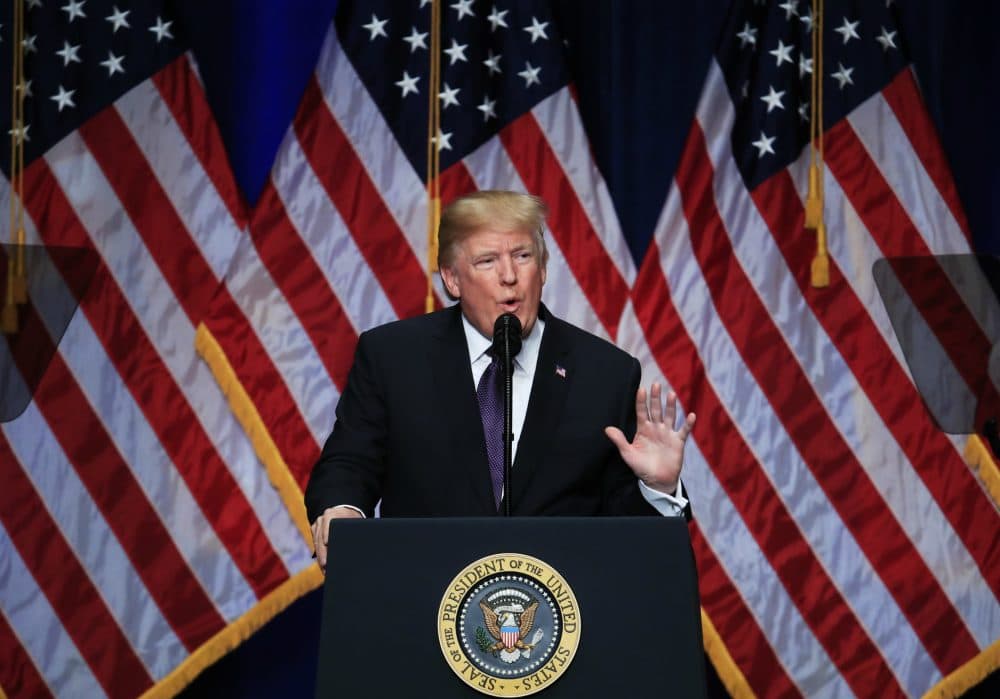Advertisement
Commentary
Trump's Security Breach: Deleting Climate Change As A Threat

Donald Trump’s continuing campaign to negate Barack Obama’s climate legacy claimed a new victory this week with the release of his first national security strategy. Contrary to Obama’s 2015 strategy, the legally required plan for addressing the country's threats conspicuously avoids naming climate change as a national security concern.
You can almost hear the chortle of some White House underling as he holds down the delete key to expunge the words Obama wrote in 2015: “Climate change is an urgent and growing threat to our national security, contributing to increased natural disasters, refugee flows, and conflicts over basic resources like food and water.”
Trump, in his first year, has withdrawn the United States from the historic Paris Agreement, moved to eliminate a plan to reduce greenhouse gas pollution from power plants, and purged references to climate change from executive branch websites. His secretary of energy is leading a movement to subsidize the moribund coal industry. So the absence of the phrase “climate change” in the new national security strategy — which helps determine foreign policy priorities -- is consistent with the administration’s belief that climate change isn’t a significant worry.
You can almost hear the chortle of some White House underling as he holds down the delete key to expunge the words Obama wrote in 2015 ...
In fact, climate is mentioned just once: “Climate policies will continue to shape the global energy system.” The author no doubt would have liked to preface that sentence with "unfortunately"; the White House would be happy if climate policies had zero effect on the global energy system. How much better things would be, the administration would say, if we could dispense with all that climate nonsense — if only those other 195 countries would just get with the program.
The generals, of course, disagree. Members of the military, including Secretary of Defense Jim Mattis, have been voicing concern about the warming climate for years. Earlier this month, Trump signed the National Defense Authorization Act, which includes a bipartisan amendment stating that “climate change is a direct threat to the national security of the United States.”
The disconnect between the defense bill and the national security strategy arises because the executive branch had much more control over the political content of the latter. But the inconsistency is glaring, and it illustrates how much the administration is out of step with other branches of the government.
[The strategy plan] mentions renewable energy in passing, but -- we can be frank -- this is about fossil fuels.
So what does the new strategy say about energy? They talk about embracing “energy dominance,” by which they mean “energy hegemony.” The idea is that the U.S. should pursue policies and project military power to ensure that American oil, gas and coal gain an upper hand in markets around the globe.
“Our Nation must take advantage of our wealth in domestic resources,” states the strategy document. It mentions renewable energy in passing, but — we can be frank — this is about fossil fuels. Trump has many times rhapsodized about the vast coal and gas reserves in the American heartland. And the new Republican tax bill opens up the Arctic National Wildlife Reserve for oil exploration and drilling. So despite a stray reference to “environmental stewardship” or “reducing traditional pollution,” the energy policy outlined in the report is firmly centered around advocacy for the unfettered development of fossil fuels.
Of course, removing those fossil resources from the ground will have calamitous effects on the climate.
After the brief mention of global climate policies, the document continues, “U.S. leadership is indispensable to countering an anti-growth energy agenda that is detrimental to U.S. economic and energy security interests.” That sentence distills the essence of the administration’s stance on climate change. In their view, the development of clean energy belongs to “an anti-growth” agenda. They’re advocating for maximizing the exploitation of fossil fuel reserves because they perceive that to be the key to driving corporate profits throughout the economy. And while they talk a lot about “economic growth” (the word “growth” appears 24 times in the strategy document), analyses indicate that Trump’s energy policy can’t deliver nearly as much growth as they’ve projected.
In reversing Obama’s inclusion of climate change as a security threat in the national security strategy, the Trump administration has brushed aside what many consider the age’s most profound peril. So, are you feeling more secure?
